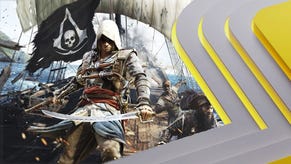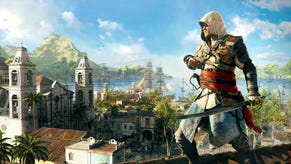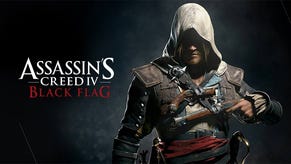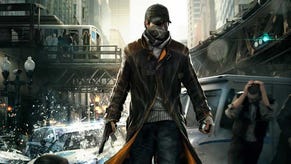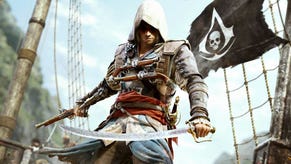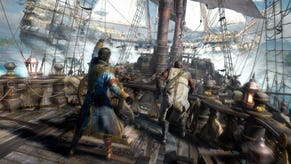Assassin’s Creed 4: Black Flag - a link to the past
Stace Harman attempts to wrap his head around Assassin's Creed 4’s modern day meta-game and takes to the open sea in search of a fresh start.
I’m stood in Abstergo Entertainment’s neat but characterless offices in Montreal, browsing a row of books with familiar titles. Among them sits the Assassin’s Creed 3 Strategy Guide, the Assassin’s Creed: Forsaken novel, Assassin’s Creed 3: Liberation and The Art of Assassin’s Creed 4: Black Flag.
Dotted around the offices are wall hangings featuring promotional game art. They depict pirates that I recognise from the two sequences of AC4 that I finished playing just moments earlier as part of a three-hour preview session in a basement bar in London. I’m confused.
Around me, Ubisoft PRs and members of the development team drift unobtrusively in and out of my peripheral vision. If I want to, I can interact with them; I can shake them by the hand and engage them in conversation. The same does not apply to the Abstergo staff members that inhabit the office laid out in front of me. They are less responsive; they are stood or sat in extended but silent conversation or maybe they’re just stuck in a perpetual animation cycle.
There’s much that I want to do that I cannot, I want to speak to these people to find out what’s going on and listen in on what they’re talking about but most of all I want to exit the offices via the door whose keypad glows a telltale red. Unable to do any of these things, I walk over to a computer terminal and access a database by solving a spherical security puzzle that sends a data kernel on an infinite loop.
I feel like I’m missing clues to a wider truth that’s staring me in the face but I wonder too if I’m about to discover something important. It turns out I’m not, instead I’m presented with a brochure whose too-small text deliberately teases clues of the fictional Abstergo’s work on the Assassin’s Creed franchise and its fictional collaboration with Ubisoft. My head hurts.
Disappointed not to have found something more enlightening, I exit Abstergo’s offices the only way I know how, via a menu screen. I leave behind the unfamiliar first-person view of Abstergo’s modern day corporate space and return to the early 18th century to watch over the shoulder of the rakish Edward Kenway as he captains the Jackdaw that proudly flies the black flag.
I feel like I’ve tumbled down the rabbit hole and into the Matrix.
The old and the new
Earlier that afternoon I’m speaking with AC4’s lead game designer about more conventional matters, like why a core part of the identity of AC4 hasn’t made it into the multiplayer modes. “We were quite disappointed to not be able to cram the naval into the multiplayer,” Jean-Sebastien Decant tells me. “But in order to deliver something polished, bug-free and gigantic we have to make choices and that’s where we had to make the decision to continue what had been done with AC3's multiplayer.”
I question whether this is a result of having to hit that mandatory end-of-year release window rather than because of any insurmountable technical challenge. Decant thinks for a moment before answering.
”Ubisoft Montreal deserves credit for tackling a new era in Assassin’s Creed 4: Black Flag, rather than trying to leverage the work it poured into last year’s Assassin’s Creed 3. There’s a huge early-18th century world to explore but, just as crucially, a whole new meta-narrative in the form of a first-person modern day component.”
“Naval multiplayer would have been to open a whole new world of crazy design and system issues and I think we would have needed more time than [six extra months],” he asserts. “It's important to respect the deadlines because they can fuel creativity and mean we don't spend too long playing around; we have to deliver.”
And there’s a lot being delivered. The side quests alone constitute enough content to swallow many hours: a fully featured pirate hideout, Kenway's ship-trading fleet game, a dozen underwater sections, blue prints and ship upgrades, hunting, harpooning, assassin contracts, sea shanty hunts and fort frolicking, amongst many other diversions. During my time inside the Animus I sample the glory of the open sea, plunder cargo ships for resources and get sidetracked by a dozen incidental activities on my way to a more critical objective. Taking to the open sea is even more liberating than the feeling of freedom afforded by AC3’s fresh wilderness.
It’s not all plain sailing, though, as I also get snagged on the rocks of some familiar bugbears. A stealth system that feels clumsy, staid and occasionally comical. The crowd camouflage system that’s rendered laughably transparent in a scarcely populated Caribbean backwater and some AI, animation and pop-in issues, which are particularly tiresome as I’m playing on next-gen hardware but that will hopefully be tidied up ahead of launch in November.
The ongoing saga
I’ve said many times before that Assassin’s Creed annual release schedule has bothered me for some time. I’ve also acknowledged that it’s hard to grumble with any great conviction when Ubisoft’s numerous development teams continue to deliver vast, value for money experiences. In some respects, the issue is one of my own making: I’ve not seen every game through to the end so feel like I’ve been left behind by an overarching story filled with intrigue and clever nods to real life events.
However, in playing AC4 on new hardware there’s also a deeper, more relevant reason for me to be grumpy. I want to see next gen design to go alongside shinier graphics and some of Assassin’s Creeds core mechanics are showing their age or, more specifically, feel like they’re being reused because there simply isn’t the time to find a more satisfactory solution.
Every team that works on an Assassin’s Creed game gets at least two years to do so and so it’s not necessarily a case of being rushed. That said, when you have lofty ambitions to render an epic war against the backdrop of a forested frontier or to throw open the world with a massively expanded naval component, it leaves little time to reinvent the wheel.
All told, Ubisoft Montreal deserves credit for tackling a new era in Assassin’s Creed 4: Black Flag, rather than trying to leverage the work it poured into last year’s Assassin’s Creed 3. There’s a huge early-18th century world to explore but, just as crucially, a whole new meta-narrative in the form of a first-person modern day component, which has the potential to finally become more than just that bit you do in an AC game when you’re not having fun.
On balance, then, there’s an awful lot here to like and so while I have my doubts and nagging pet peeves, come the chilly month of November I’ll be diving into the warm waters of AC4 to see if it can’t win me over. Based on current evidence, Ubisoft has earned the chance to try.
Assassin’s Creed 4: Black Flag launches on current and next gen platforms starting October 29.





